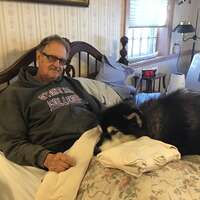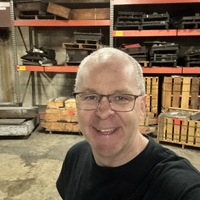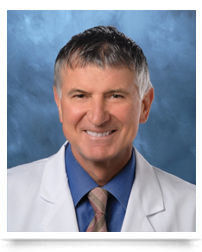About Me (In My Own Words)
I've known I had mitral valve prolapse since I was 21 years old and my girlfriend, a nurse working at the Debakey Center in Houston though I might have Marfans disease. Lots of test later, with visits from a dozen doctors and interns, all listening to my heart, I was told I had the not uncommon prolapse of the mitral valve (and no Marfans!). But apparently it expressed itself in unusual ways and they had made me into a diagnostic package for Baylor Medical School. I was told that I shouldn't worry but should expect to have to keep an eye on it further down the line.
45 years later, during the trauma of gradually losing my 32 year old African Grey parrot to Cardiovascular(!) disease, my doctor noted that my blood pressure had risen significantly. My diet and exercise regime did not raise any issues so he sent me for tests to see if there was some underlying cause.
I chose to travel back to Portland from where I had moved shortly before and have tests done at OHSU. Tests included an angiogram, right heart catheterization, EKG, TEE, and blood work. During a meeting with the chief heart surgeon and an interventional cardiologist afterwards I was told that I had a complex prolapse involving both posterior and anterior leaflets. They indicated they could not guarantee a 95% chance of repair and suggested I wait as long as I could before have a valve replacement, after which "the clock would start ticking" on the useful life of the valve. Since I had already begun research and had determined that this facility was not noted for success in heart repair surgery, this did not come as a complete surprise.
Diving back into research, I had read perhaps 75 journal articles before seeing a local cardiologist. Oddly, in all those years of every doctor knowing I had mitral valve issues, no one had ever suggested that I have an echocardiogram to see where things stood. The upside was that surgical practice for the procedure had advanced significantly in that time. So my cardiologist suggested I wait 6 months and have another echo to see what the trend was. Before that time had passed, my cardiologist retired. So I was sent to a new doctor with my new echo indicating not much had changed. It turned out that he strongly disagreed with the assessment and suggested I start seriously looking for a surgical team. I was already whittling the list down and finally sent my records to Cleveland Clinic and Cedars Sinai, two of the standouts that also accepted my insurance. The final decision was informed by shorter travel distances and a favorable opinion of Dr Chikwe.
Although I was confident in the surgical team, I found a slight anxiety creeping in as the surgery date crept closer. But Dr Chikwe's staff was very reassuring over the phone, so my arrival at the hospital was fairly drama free. I met with Dr Chikwe and her chief assistant Vivian and began to feel very good about my choice.
Two days later, I arrived early in the morning for surgery prep. As I was wheeled into the surgery room, a crowd of surgical assistants decended upon me and, as I glanced across the room, I spotted the DaVinci machine that was about to play a role in the transformation of my rickety heart. Dr Chikwe is known for making extensive use of the DaVinci and had given me a 99% chance of a successful repair. I understand it took her only two hours to complete a triangular resection with an annular ring, a fairly routine procedure for Dr Chikwe (but apparently too much of a challenge for the group back a OHSU) - dedicated experience matters. Nothing was done to the anterior leaflet and the result was going from a 70% regurgitation rate to zero. When a follow up TTE was underway, I glanced back at the screen and could hardly believe what I saw - a perfectly normal valve appearance. When I awoke in ICU, I felt a bit like Frankenstein with tubes and IVs attached every where. Fortunately I was not awake for the removal of the breathing tube as my wife indicated that had been a struggle.
The nursing staff in ICU was excellent and very attentive. Pain management was obviously a high priority. I rarely felt pain I could attribute to the surgery. The tubes and one 5 inch long IV were however, pretty uncomfortable. And to make it more interesting, my back went out. Sleep became a precious commodity but very quickly they added orally administered oxycodone in addition to the intravenous drip that supplied something like Lidocane to the areas where most of the surgical incisions had been made. So I made it through with very little pain.
Bathroom breaks were interesting affairs requiring help from staff. Both of my normal waste outputs went awry in the beginning. Meds for constipation and added water intake eventually got peeing under control, but I didn't have a normal bowel moment until I got home.
I had numerous visits from a doctor and a PA, both women, from Dr Chickwe's office. I was oddly comforted by this all female team, but then I have always favored those times when I had a female doctor. It has appeared to me that women seem to make it through medical education with slightly more empathy intact than the typical male doctor. But that's likely just my own particular experience.
I was moved from ICU to CCU for a few additional days with a flurry of nursing staff continually monitoring my vital signs. In both instances these were private rooms. I don't know how common that is, but it is a treat for sure. Aside from one overnight increase in oxygen levels to assist in lung rehabilitation, the whole affair was without issues. After a final visit from Dr Chikwe and a little work to get discharge underway I left the hospital for a few days in a local hotel before my final meeting with Vivian to assess my status before sending me home to Oregon.
Recovery has been surprisingly easy. There is more discomfort than actual pain. And after over two weeks of poor sleep with 4 hr maximum intervals, I got through 7 hrs last night with the help of one of my infrequently used oxycodone tablets.
So I can't recommend the experience with Cedars Sinai, Dr Chikwe and her staff quite enough to describe my satisfaction. And to top it off, during my visit with my local cardiologist today, he said I couldn't have expected a better result and that it was clear I had made a good decision.
More Info About Me & My Heart
More About Me
-

I am from:
Albany
-

My surgery date is:
November 30, 2022
-

I was diagnosed with:
Mitral Regurgitation
-

My surgery was:
Mitral Valve Repair
-

-

My hospital is:
Cedars Sinai
 I am from: Albany
I am from: Albany My surgery date is: November 30, 2022
My surgery date is: November 30, 2022





